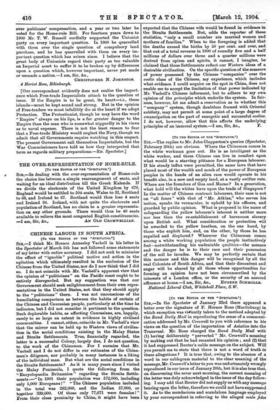CHINESE LABOUR IN SOUTH AFRICA.
[To TUN EDITOR OF THR"SPECTATOR."] think Mr. Horace Annesley Vachell in his letter in the Spectator of March 5th has not followed some statements of my letter with entire accuracy. I did not seek to minimise the effect of " ignoble " political motive and action in the agitation which ultimately resulted in the exclusion of the Chinese from the United States, nor do I now think that I did so. I do not coincide with Mr. Vachell's apparent view that the opinion of "politicians" on the Pacific coast ought to be entirely disregarded. But my suggestion was that our Government should seek enlightenment from their own repre- sentatives in the United States, not that they should apply to the "politicians" there. I was not unconscious of the humiliating comparison as between the habits of certain of the Chinese and Caucasian people, particularly at the time he indicates, but I did not consider it pertinent to the question. Such deplorable habits, as affecting Caucasians, are, happily, rarely to so large an extent in evidence in highly civilised communities. I cannot, either, coincide in Mr. Vachell's view that the mirror can be held up to Western views of civilisa- tion in the social conditions existing in the Malay States and Straits Settlements. True, financially regarded, the latter is a successful Colony, largely due, I do not question, to the work of the Chinaman. For I surmise that Mr. Vachell and I do not differ in our estimates of the China- man's diligence, nor probably in many instances in a liking of the individual man But what are the social conditions in the Straits Settlements ? As it is many years since I visited the Malay Peninsula, I quote the following from the "Encyclopaedia Britannica " regarding the Straits Settle- ments :—" In 1901 their population was 572,000, including only 5,000 Europeans 1" "The Chinese population included in 'the total was 282,000, and the Indian 57,000, or together 339,000. Of these only 77,671 were females !" From their close proximity to China, it might have been
expected that the Chinese wife would be found in evidence in the Straits Settlements. But, adds the reporter of these statistics, "only a small number are married women and mothers of families." When to the foregoing is added that the deaths exceed the births by 50 per cent. and over, and that out of a total revenue in 1900 of roundly five and a half millions of dollars over three and a quarter millions were derived from opium and spirits, it cannot, I imagine, be claimed that these Settlements reflect our Western ideas of a desirable civilisation. On the specific question of the measure of power possessed by the Chinese "companies" over the coolie class of the Chinese, my experience, which includes what evidence I could acquire on the spot in China, does not enable me to accept the limitation of that power indicated by Mr. Vachell's Chinese informant, but to adhere to my own opinion of the principles which underlie the system. In fair- ness, however, let me admit a reservation as to whether this " company " system, though doubtless framed with Oriental subtlety, may not permit at some point of a large degree of emancipation on the part of energetic and successful coolies. I do not, however, allow that this affects the underlying principles of an immoral system.—I am, Sir, &c., F.










































 Previous page
Previous page